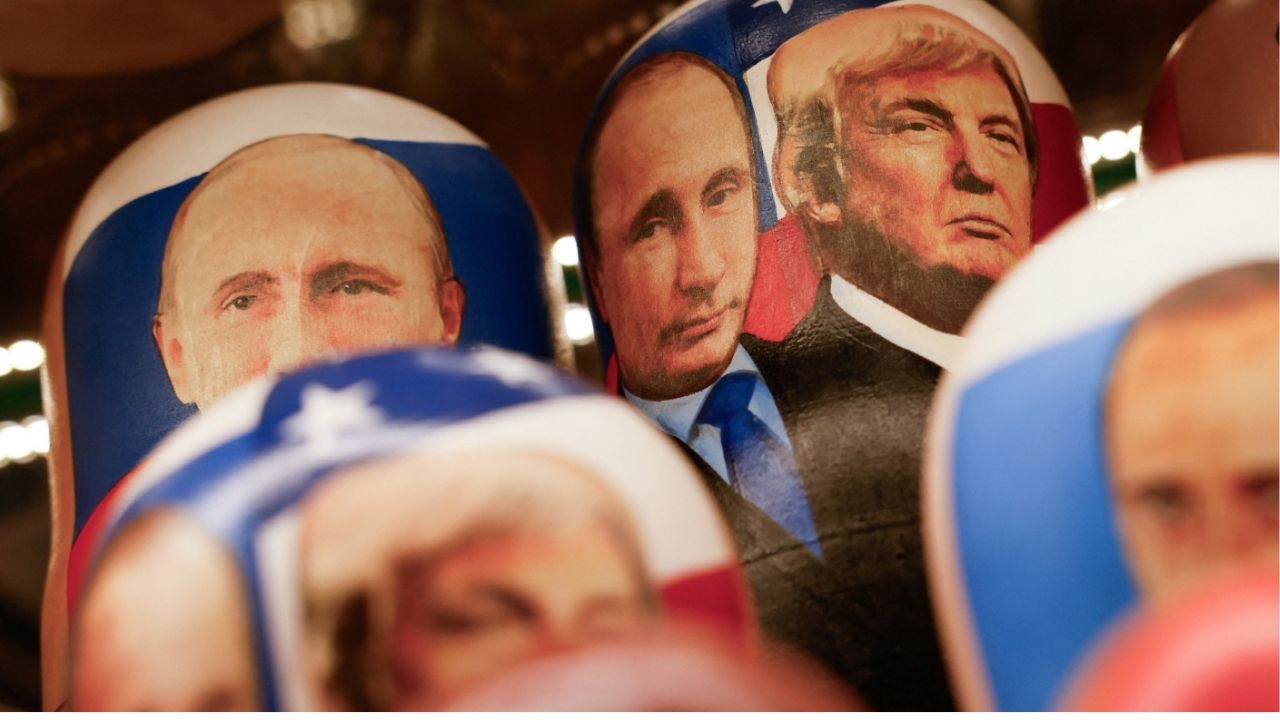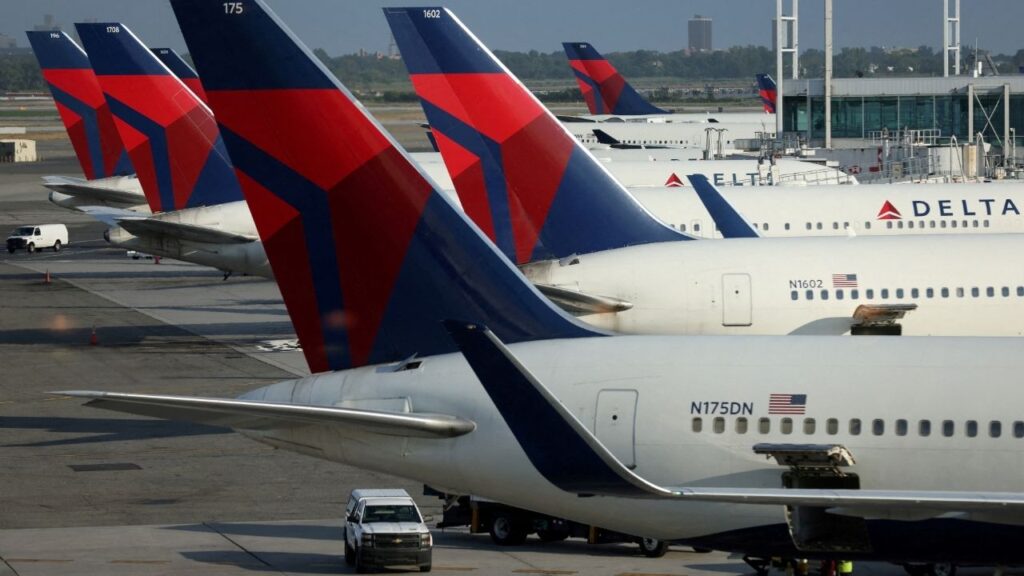Russian traditional nesting dolls, known as Matryoshkas, with images of Russian President Vladimir Putin and U.S. President Donald Trump are placed on a shelf during a demonstration at a gift shop in central Moscow, Russia, August 12, 2025. (Reuters/Yulia Morozova/File)

- Our European allies were aghast last week at Trump’s response to the swarm of around 20 drones that Russia sent across Polish borders.
- When it comes to foreign policy, Trump is not playing either checkers or chess. He’s playing Monopoly.
- Trump's foreign policy decisions often hinge on whether a country is the site for a future Trump hotel or golf course and on whether their leaders will flatter his ego.
Share
|
Getting your Trinity Audio player ready...
|
Since President Donald Trump decided to rebrand the Defense Department as the “Department of War,” to more accurately reflect how tough he is, I suggest we rebrand the White House as “The Waffle House” — to more accurately reflect Trump’s incessant waffling when it comes to actually doing something to deter Vladimir Putin’s steadily increasing onslaught on Ukraine, not to mention his recent drone incursion into America’s NATO ally Poland.
I was in Ukraine last week, attending the Yalta European Strategy conference in the capital, Kyiv, and interviewing Ukrainian and European officials, analysts and entrepreneurs. Some version of the same question came up quietly in almost every private conversation: What in the world is going on with your president? Putin keeps spitting in Trump’s eye and Trump keeps telling the world that it’s raining.
No one wants to say this publicly right now. Indeed, at the opening of the conference, President Volodymyr Zelenskyy of Ukraine could not have expressed more gratitude to Trump, as did several key NATO foreign ministers and national security advisers. They are clearly hoping that if everyone pretends that Trump is doing a lot — letting NATO allies use their own money to buy arms for Kyiv, even though Trump has not allocated a dime of fresh U.S. money to do so — the U.S. president will not abandon Ukraine altogether.
Allies Shocked by Trump’s Indifference to Russian Drones in Poland
But our European allies were aghast last week at Trump’s response to the swarm of around 20 drones that Russia sent across Polish borders, prompting NATO to scramble fighter jets to shoot them down. While Poland’s prime minister, Donald Tusk, told his parliament the episode was “the closest we have been to open conflict since World War II,” all that Trump could muster was a post on his Truth Social platform: “What’s with Russia violating Poland’s airspace with drones? Here we go!”
A day later, though, he made clear he was going nowhere. “It could have been a mistake,” he said of the drone penetration.
(According to the German publication WELT, five of the Russian drones were on a direct flight path toward a NATO base before being intercepted by Dutch Lockheed Martin F-35 fighter jets, suggesting they were probably dispatched to test NATO reflexes.)
I love Trump’s turn of phrase: “What’s with Russia violating Poland’s airspace with drones?” Our president sounds like a teenage blogger commenting on some movie star who did something embarrassing in public — not the leader of the free world. If Putin had any sense of humor he would post on Truth Social: “Donald, what’s with that Department of War thing?”
Every day that goes by, Trump seems to add another condition or another timeline for when he will impose meaningful economic sanctions on Russia, as Putin steps up his attacks on Ukraine. Trump’s latest formulation posted over the weekend is that all nations in Europe, most of whom have already sharply cut back their imports of Russian oil, would need to stop buying oil from Moscow entirely. In addition, all NATO nations need to impose tariffs of 50% to 100% on China. A serious president would not be posting such demands on social media. He and his staff would be working the phones.
I have always avoided the more conspiratorial explanations for Trump’s behavior. I do not believe that the U.S. president is somehow a Putin asset (though he sure knows how to play one on TV). What I believe is that Trump is simply different from any U.S. president since World War II — and not in a good way.
For starters, he does not share the bedrock commitment that the Atlantic alliance is the greatest coalition in history for expanding and defending zones of free people, free markets and the rule of law.
Trump’s Foreign Policy Is Based on Board Game ‘Monopoly’
At the same time, it is hardly a secret that Trump is a man fueled by grudges and grievances. I suspect that he has never forgiven Zelenskyy for not giving him the dirt on Joe Biden that Trump sought in his first term — a crazy ask that eventually, through many twists and turns, led to Trump’s first impeachment trial.
Another explanation is that there is no real policymaking process in this administration. There is no sign that any of Trump’s policy declarations conveyed through social media are vetted first by area experts in the State Department or the CIA, no sign that anything is run by the Senate or House Foreign Affairs committees.
The other explanation I offered to my European and Ukrainian friends went like this: You know how we often say that the Chinese are much more sophisticated players of the game of nations — that while we play checkers, the Chinese play chess, always thinking many moves ahead. Well, it’s sort of like that with Trump. Only Trump is not playing either checkers or chess. He’s playing Monopoly.
He does not judge countries on whether they share our democratic values — or even our interests. He judges them on whether they are Boardwalk or Baltic Avenue, on whether we have a trade surplus or trade deficit with them, on whether they are the site for a future Trump hotel or golf course and on whether their leaders will flatter his ego or not.
If you don’t flatter Trump and you have a trade surplus with us — say India — your democratic system may not save you from Trump’s tariffs. But if you flatter him, as Putin does, and if you offer him investment opportunities, as Putin also does, then Trump may not impose a single new tariff on you even if, like Russia, your economy runs a trade surplus with America.
Alas, even Trump seems lately to have lost track of all the different conditions that he has set before he will do anything meaningful to punish Russia, which is probably why he just let loose Saturday with what’s really in his heart when it comes to Ukraine.
“This is not TRUMP’S WAR,” Trump wrote on Truth Social. “It is Biden’s and Zelenskyy’s WAR.”
You notice that he doesn’t say it’s Putin’s war — the man who actually started it.
Trump Now Owns the Ukraine War
Sorry, Mr. President. This is YOUR war now. Because you and you alone have the ability to deliver to Ukraine the military resources to send the message to Putin that time is not on his side, that he will have to accept a deal. Unfortunately it’s a deal that will allow the Russian president to keep some of the territory in eastern Ukraine that he has seized by force — but the condition for that is that Putin must accept Western security guarantees for Ukraine aimed at ensuring that no Russian leader will ever dare invade again, as well as Ukrainian membership in the European Union.
If you, Mr. President, walk away from Ukraine and let it be overrun by the Russian dictatorship, you can post on Truth Social all you want, and you can give as many interviews with Fox News as you please, but your name will forever be spoken in the same breath as Neville Chamberlain — and well it should.
It takes my breath away that only one Republican in Congress has had the guts to tell Trump that. God bless Rep. Don Bacon of Nebraska — a former Air Force brigadier general who responded to Trump’s attempt to weasel out of responsibility with a post of his own on social platform X: “Mr. President, Putin is the one who is the invader. And now this war is on your watch, and you’ll be judged in the history books in the decades to come by your actions or lack thereof.”
This article originally appeared in The New York Times.
c.2025 The New York Times Company
RELATED TOPICS:
Categories

Fresno Police Seek Man Wanted in Three Armed Robberies


















